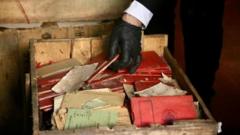In an extraordinary turn of events, employees of Argentina's Supreme Court stumbled upon wooden crates in the building's basement that are believed to contain important documents from the Nazi regime. The crates, which were uncovered during efforts to prepare for the relocation of archival materials to a newly established museum, are thought to have arrived in Argentina on June 20, 1941, via 83 diplomatic pouches shipped from the German embassy in Tokyo aboard a Japanese steamship known as the Nan-a-Maru.
These crates came into the possession of the Supreme Court after Argentine customs officials seized them due to suspicions regarding their contents. Workers in the basement found these wooden boxes and, upon opening them, discovered a cache of materials intended to disseminate Adolf Hitler's ideology in Argentina during World War II.
The contents largely comprise membership booklets adorned with Nazi insignia and black-and-white photographs that may illuminate the financial networks and international connections of the Nazis during this tumultuous period. Upon realizing the historical significance of the documents, court officials promptly engaged experts from the Buenos Aires Holocaust Museum for assistance in cataloging the materials.
The Argentine Supreme Court has revealed that the documentation had previously been labeled as "personal effects" by the German embassy in Buenos Aires. However, Argentine customs were wary of the suspiciously substantial shipment, which prompted an alert to the foreign minister. In September 1941, a judge mandated the seizure of all 83 pouches, yet no clear decision was reached about their future use until after 1944, following Argentina’s severance of ties with the Axis powers.
Post-World War II, Argentina, under President Juan Perón, became notorious as a refuge for several high-profile Nazis, including the likes of Adolf Eichmann and Josef Mengele. In a later acknowledgment of this troubling past, former President Fernando de la Rúa extended an apology in 2000 for Argentina's role in sheltering individuals accused of war crimes.


















